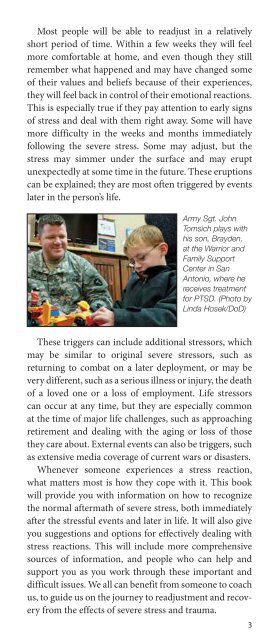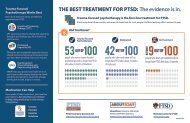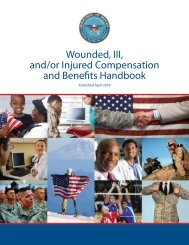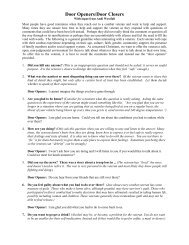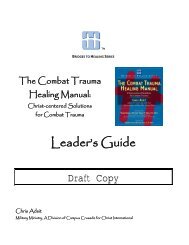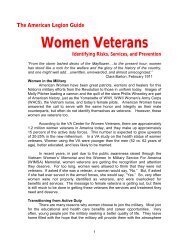DAV PTSD Brochure
Create successful ePaper yourself
Turn your PDF publications into a flip-book with our unique Google optimized e-Paper software.
Most people will be able to readjust in a relatively<br />
short period of time. Within a few weeks they will feel<br />
more comfortable at home, and even though they still<br />
remember what happened and may have changed some<br />
of their values and beliefs because of their experiences,<br />
they will feel back in control of their emotional reactions.<br />
This is especially true if they pay attention to early signs<br />
of stress and deal with them right away. Some will have<br />
more difficulty in the weeks and months immediately<br />
following the severe stress. Some may adjust, but the<br />
stress may simmer under the surface and may erupt<br />
unexpectedly at some time in the future. These eruptions<br />
can be explained; they are most often triggered by events<br />
later in the person’s life.<br />
Army Sgt. John<br />
Tomsich plays with<br />
his son, Brayden,<br />
at the Warrior and<br />
Family Support<br />
Center in San<br />
Antonio, where he<br />
receives treatment<br />
for <strong>PTSD</strong>. (Photo by<br />
Linda Hosek/DoD)<br />
These triggers can include additional stressors, which<br />
may be similar to original severe stressors, such as<br />
returning to combat on a later deployment, or may be<br />
very different, such as a serious illness or injury, the death<br />
of a loved one or a loss of employment. Life stressors<br />
can occur at any time, but they are especially common<br />
at the time of major life challenges, such as approaching<br />
retirement and dealing with the aging or loss of those<br />
they care about. External events can also be triggers, such<br />
as extensive media coverage of current wars or disasters.<br />
Whenever someone experiences a stress reaction,<br />
what matters most is how they cope with it. This book<br />
will provide you with information on how to recognize<br />
the normal aftermath of severe stress, both immediately<br />
after the stressful events and later in life. It will also give<br />
you suggestions and options for effectively dealing with<br />
stress reactions. This will include more comprehensive<br />
sources of information, and people who can help and<br />
support you as you work through these important and<br />
difficult issues. We all can benefit from someone to coach<br />
us, to guide us on the journey to readjustment and recovery<br />
from the effects of severe stress and trauma.<br />
3


